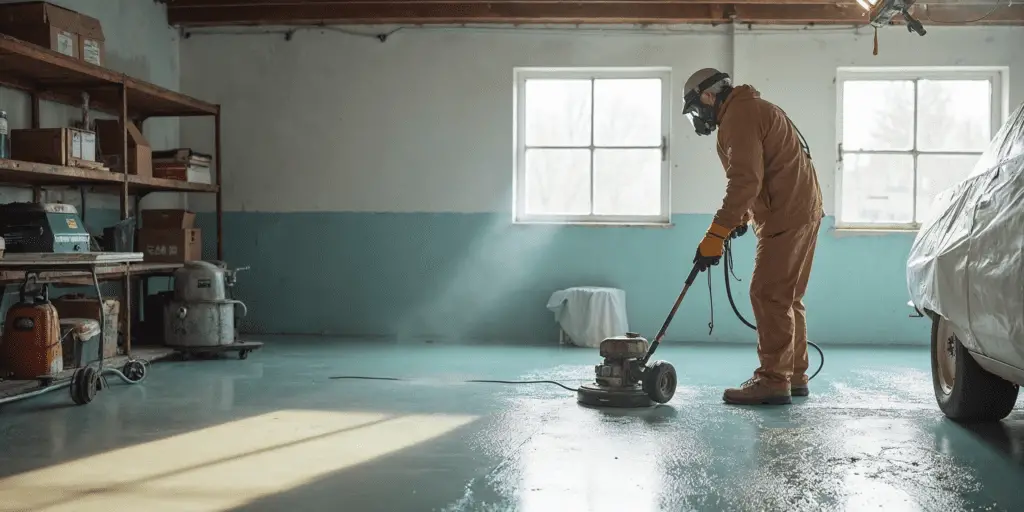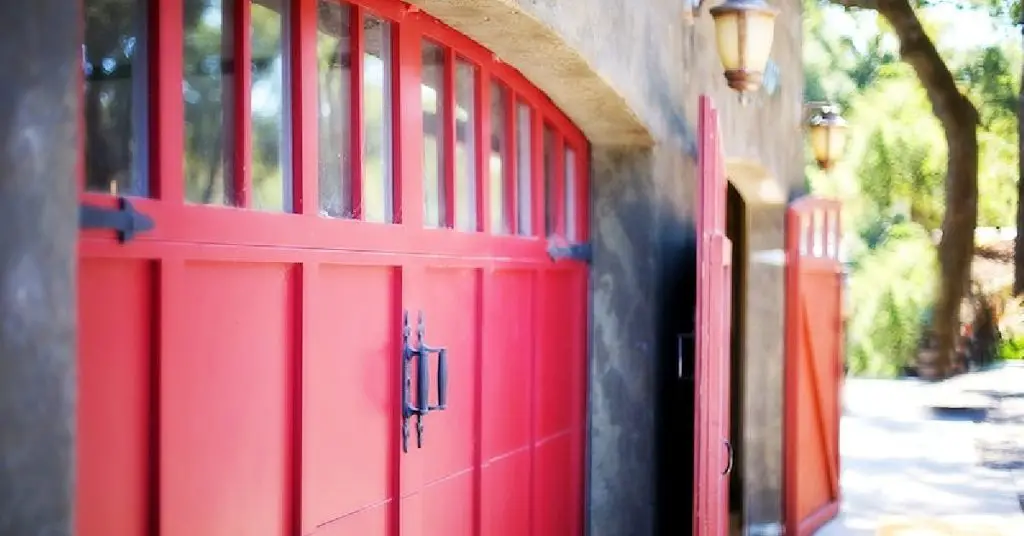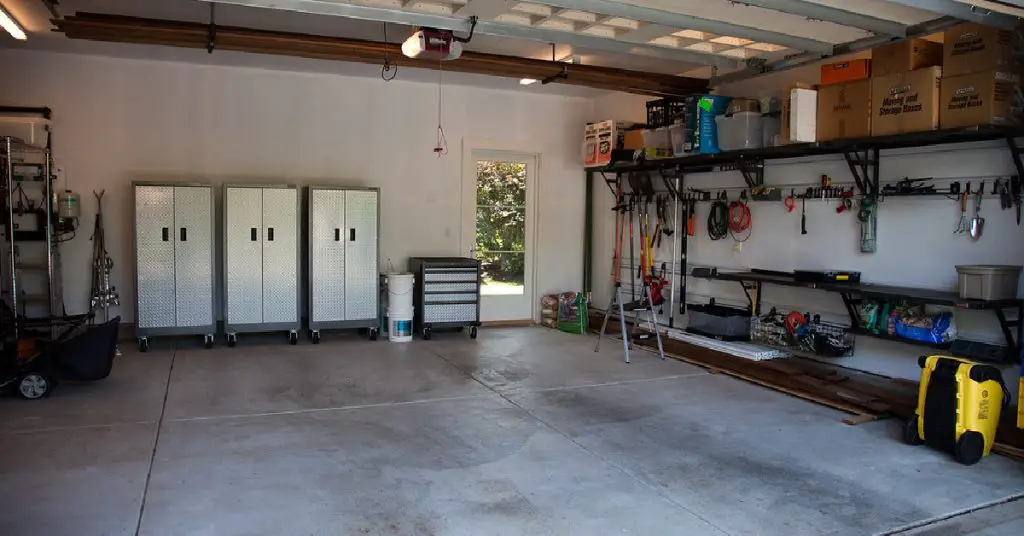Have you got a garage floor covered in old, peeling paint? Or maybe you’ve accidentally spilled some paint during your latest DIY project? Don’t worry, we’ve got you covered. This comprehensive guide will walk you through everything you need to know about how to remove paint from garage floor.

Key Takeaways:
- Choose from 4 main methods: grinding/sandblasting, chemical strippers, pressure washing, or heat guns
- Always wear proper safety gear (goggles, respirator, gloves)
- Match removal method to paint type – latex is easiest, epoxy most challenging
- Clean and inspect the floor thoroughly after removal before applying new coatings
- Consider professional help for large jobs or lead-based paint
Why Remove Paint from Your Garage Floor?
A clean, paint-free garage floor isn’t just about aesthetics. It can:
- Improve safety by eliminating slippery surfaces
- Prepare the floor for a new coating or finish
- Reveal hidden damage or cracks that need repair
Let’s dive into the nitty-gritty of paint removal!
Understanding Your Garage Floor
Before you start scraping away, knowing what you’re dealing with is crucial. Garage floors are typically made of concrete, but the type of paint can vary:
- Latex paint: Water-based and easier to remove
- Oil-based paint: More durable and challenging to strip
- Epoxy coatings: Tough and resistant to most removal methods
Take a close look at your floor. Is the paint peeling or well-adhered? Are there multiple layers? This information will help you choose the best removal method.
Safety First: Gearing Up for Paint Removal
Don’t skimp on safety! Here’s what you’ll need:
- Safety goggles
- Respirator mask
- Gloves
- Long-sleeved clothing
- Proper ventilation (open those garage doors!)
Pro tip: Cover nearby items with plastic sheeting to protect them from dust and debris.
4 Effective Methods for How to Remove Paint From Garage Floor
1. Mechanical Removal
Grinding
This method uses abrasive tools to remove paint from the concrete surface physically.
You’ll need:
- Concrete grinder with diamond cup wheel
- Dust shroud
- Industrial vacuum
Steps:
- Attach the diamond cup wheel to the grinder
- Connect the dust shroud and vacuum
- Start grinding in small sections, moving steadily
- Vacuum thoroughly after each pass
Pros:
- Effective for large areas
- Prepares surface for new coatings
Cons:
- Can be labor-intensive
- It might create an uneven surface if not done carefully
Sandblasting
This technique uses high-pressure sand to blast away paint.
Steps:
- Set up sandblasting equipment
- Apply sand at high pressure to the painted surface
- Move systematically across the floor
Pros:
- Great for stubborn paint
- Works well on textured surfaces
Cons:
- Requires specialized equipment
- Can be messy
2. Chemical Removal
Paint strippers can be a game-changer for removing paint from concrete.
You’ll need:
- Chemical paint stripper
- Plastic scraper
- Wire brush
Steps:
- Apply a thick layer of stripper with a brush or roller
- Let it sit for 15-30 minutes
- Scrape off loosened paint
- Use a wire brush for stubborn spots
- Rinse thoroughly and neutralize if needed
Pros:
- Effective on multiple layers
- Less elbow grease is required
Cons:
- Can be messy
- Proper disposal of chemicals is necessary
3. Pressure Washing
For exterior garage floors, pressure washing can be a powerful ally.
You’ll need:
- Pressure washer (3000 PSI or higher)
- 15-degree nozzle
Steps:
- Set up the pressure washer
- Start at one corner, working in sections
- Hold the nozzle about 12 inches from the surface at a 45-degree angle
- Move the nozzle in a sweeping motion
Pros:
- Quick for removing loose paint
- Less manual labor
Cons:
- May not remove all paint
- Can be mess
4. Heat Methods
Sometimes, a little heat is all you need to loosen stubborn paint.
You’ll need:
- Heat gun
- Scraper
Steps:
- Apply heat to a small section until the paint bubbles
- Scrape off the softened paint
- Move to the next section and repeat
Pros:
- Effective for small areas
- No chemicals required
Cons:
- Time-consuming for large areas
- Can release fumes from heated paint
Tackling Specific Paint Types
Latex Paint: Often the easiest to remove. Start with a pressure washer or chemical stripper.
Oil-Based Paints: These are tougher. Chemical strippers or mechanical methods usually work best.
Epoxy Coatings: The most challenging. Grinding or professional-grade chemical strippers are often necessary.
Post-Removal Care: Giving Your Floor Some TLC
Once you’ve removed the paint, don’t forget these crucial steps:
- Clean thoroughly with a shop vacuum and damp mop
- Inspect for remaining paint or damage
- Fill cracks or holes with concrete patching compound
- Allow the floor to dry completely before applying any new coatings
Preventing Future Paint Problems
An ounce of prevention is worth a pound of cure! Try these tips:
- Use drop cloths when painting in the garage
- Apply a concrete sealer for easier future cleaning
- Consider professional-grade floor coatings for long-lasting protection
When to Call in the Pros
Sometimes, it’s best to leave it to the experts. Consider professional help if:
- The job seems too big or complex
- You’re dealing with potential lead-based paint in older homes
- Do you want to explore decorative concrete options after paint removal
Eco-Friendly Paint Removal: Going Green
For the environmentally conscious, try these options:
- Low-VOC chemical strippers
- Soy-based paint removers
- Mechanical methods with proper dust control
Transforming Your Garage Floor: Beyond Paint Removal
Once your floor is paint-free, why not give it a makeover? Consider:
- Polished concrete for a sleek, modern look
- Decorative concrete techniques for added flair
- High-performance coatings for durability and style
Troubleshooting Common Issues
Stubborn paint residue? Try a combination of methods, like chemical stripping followed by grinding.
Uneven paint removal? A second pass with a grinder can help smooth things out.
Unexpected concrete damage? Consult a professional for proper repairs before applying any new finishes.
Wrapping It Up
Removing paint from your garage floor might seem daunting, but with the right tools and techniques, you can restore your concrete to its former glory. Whether you choose mechanical, chemical, or heat-based methods, always prioritize safety and take your time for the best results.
FAQs About How to Remove Paint From Garage Floor
How Long Does Paint Removal Typically Take?
It depends on the size of your garage and the method used. Chemical stripping can take a few hours, while mechanical methods might require a full day or more.
Can I Remove Paint From a Stamped Concrete Garage Floor?
Yes, but be careful with mechanical methods to avoid damaging the pattern. Chemical strippers or careful pressure washing are often better choices.
What Should I Do if I Encounter Asbestos Tiles Under the Paint?
Stop work immediately and contact a professional asbestos removal service. Asbestos can be extremely hazardous if disturbed.
How Soon Can I Park on My Garage Floor After Paint Removal?
Wait at least 24 hours to allow any cleaning solutions to dry completely. If you’ve applied a new coating, follow the manufacturer’s instructions for curing time.
Are There Any Diy Methods for Testing the Type of Paint on My Floor?
Try rubbing the paint with denatured alcohol. If it comes off, it’s likely latex. If not, it’s probably oil-based or epoxy.
Remember, a clean garage floor is the foundation for a great-looking and functional space. Happy paint removal!


